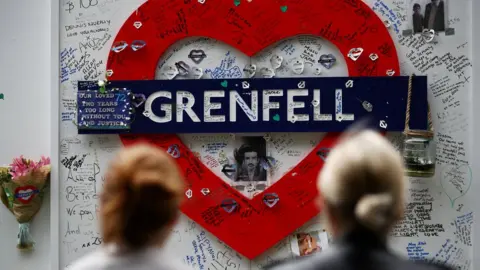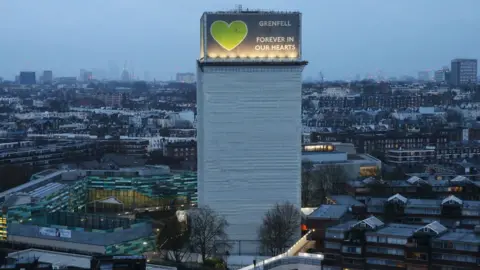Grenfell: Cladding firm suggested use of cheaper panels
 REUTERS/Hannah McKay
REUTERS/Hannah McKayA cladding company manager suggested using a cheaper material for the Grenfell Tower refurbishment, a 2013 email seen by the inquiry has shown.
Mark Harris, of Harley Facades, told architects his firm's preference, "from a selfish point of view", was to use aluminium composite material (ACM).
ACM was "tried and tested" and the firm had used it many times before, he said.
It was eventually used on the tower, with the inquiry concluding it fuelled the 2017 fire that killed 72 people.
Now in its second phase, the inquiry is looking into how the building came to be covered in such cladding.
It is the first detailed evidence the inquiry has heard suggesting reasons why the material was changed during the refurbishment programme between 2012 and 2016, with catastrophic consequences.
The inquiry's witness on Wednesday, Tomas Rek, a former employee of architects Studio E, was questioned about a meeting he attended on 27 September 2013 at Hay's Galleria in London with representatives from Harley Facades, the cladding subcontractor.
Mr Rek worked on the block's revamp between September and December 2013 and helped prepare drawings and the project's National Building Specification, a document used by designers to describe required materials, standards and workmanship.
At the meeting, the two firms discussed the cladding options and Harley Facades showed him its portfolio, including a project at Ferrier Point in Canning Town, east London, which had used ACM panels.
Mr Rek told the inquiry he thought the focus of the meeting was "more to do with the appearance and price of the various materials and not their fire performance or fire rating".
Afterwards, lead Studio E architect Bruce Sounes sent an email to Mr Harris of Harley saying his "back of a fag packet" figure for the cladding had been deemed over-budget, according to emails.
The next month, Mr Harris emailed Mr Rek regarding pricing, saying from a "Harley selfish point of view our preference would be to use ACM", adding the firm was "confident of the cost base".
 Getty Images/Hollie Adams
Getty Images/Hollie AdamsSeparately, Mr Rek told the inquiry the Royal Borough of Kensington and Chelsea, the client for the project, was putting his firm "under some kind of pressure" to use the cheaper materials.
By July 2014, the BBC has previously revealed, council officials had decided to change the cladding to the more dangerous material, reducing the budget by less than £300,000.
Mr Rek also said he was unaware of several fire safety requirements for buildings and considered it a "subject outside of my competence".
He said he did not know at the time what would constitute a material of limited flammability and was unaware how individual parts of the cladding system should be considered for fire issues.
The council has admitted a series of failings by its building control department which signed off the work despite the safety risk.
Harley Facades will give evidence later in the process.
